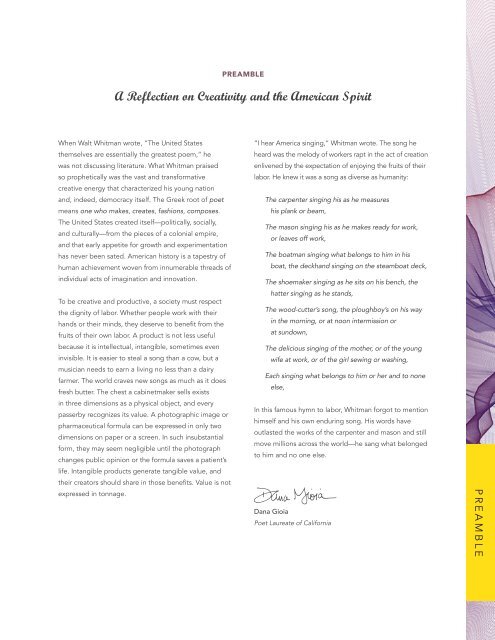ENFORCEMENT
eop_ipec_jointstrategicplan_hi-res
eop_ipec_jointstrategicplan_hi-res
Create successful ePaper yourself
Turn your PDF publications into a flip-book with our unique Google optimized e-Paper software.
PREAMBLE<br />
A Reflection on Creativity and the American Spirit<br />
When Walt Whitman wrote, “The United States<br />
themselves are essentially the greatest poem,” he<br />
was not discussing literature. What Whitman praised<br />
so prophetically was the vast and transformative<br />
creative energy that characterized his young nation<br />
and, indeed, democracy itself. The Greek root of poet<br />
means one who makes, creates, fashions, composes.<br />
The United States created itself—politically, socially,<br />
and culturally—from the pieces of a colonial empire,<br />
and that early appetite for growth and experimentation<br />
has never been sated. American history is a tapestry of<br />
human achievement woven from innumerable threads of<br />
individual acts of imagination and innovation.<br />
To be creative and productive, a society must respect<br />
the dignity of labor. Whether people work with their<br />
hands or their minds, they deserve to benefit from the<br />
fruits of their own labor. A product is not less useful<br />
because it is intellectual, intangible, sometimes even<br />
invisible. It is easier to steal a song than a cow, but a<br />
musician needs to earn a living no less than a dairy<br />
farmer. The world craves new songs as much as it does<br />
fresh butter. The chest a cabinetmaker sells exists<br />
in three dimensions as a physical object, and every<br />
passerby recognizes its value. A photographic image or<br />
pharmaceutical formula can be expressed in only two<br />
dimensions on paper or a screen. In such insubstantial<br />
form, they may seem negligible until the photograph<br />
changes public opinion or the formula saves a patient’s<br />
life. Intangible products generate tangible value, and<br />
their creators should share in those benefits. Value is not<br />
expressed in tonnage.<br />
“I hear America singing,” Whitman wrote. The song he<br />
heard was the melody of workers rapt in the act of creation<br />
enlivened by the expectation of enjoying the fruits of their<br />
labor. He knew it was a song as diverse as humanity:<br />
The carpenter singing his as he measures<br />
his plank or beam,<br />
The mason singing his as he makes ready for work,<br />
or leaves off work,<br />
The boatman singing what belongs to him in his<br />
boat, the deckhand singing on the steamboat deck,<br />
The shoemaker singing as he sits on his bench, the<br />
hatter singing as he stands,<br />
The wood-cutter’s song, the ploughboy’s on his way<br />
in the morning, or at noon intermission or<br />
at sundown,<br />
The delicious singing of the mother, or of the young<br />
wife at work, or of the girl sewing or washing,<br />
Each singing what belongs to him or her and to none<br />
else,<br />
In this famous hymn to labor, Whitman forgot to mention<br />
himself and his own enduring song. His words have<br />
outlasted the works of the carpenter and mason and still<br />
move millions across the world—he sang what belonged<br />
to him and no one else.<br />
Dana Gioia<br />
Poet Laureate of California<br />
PREAMBLE


